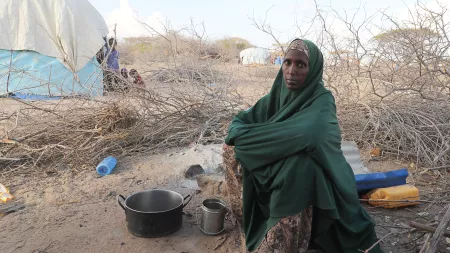The 27th Conference of the Parties of the UNFCCC (COP27) should be used by rich countries to increase finance for adaptation and loss and damages as demanded by vulnerable low-income countries. This must complement greater efforts to reduce emissions and move away from fossil fuels in line with the 1.5°C limit, in particular by the G20 countries.
Decades of progress are currently being reversed in the Horn of Africa due to climate change-induced drought. Floods have destroyed critical infrastructure in vulnerable countries and left more than 1000 people dead in Pakistan whilst 36.1 million people are going hungry in the Horn of Africa as it faces its worst drought in 40 years. In Nigeria according to UNICEF, floods have displaced 1.3 million people, over 600 people have lost their lives and over 200,000 houses have either been partially or fully damaged by floods.
As 2022 more than ever before marks the era of loss and damage, COP27 must kick off an era of solidarity and living up to responsibility.Marlene Achoki, CARE Climate Justice Global Policy Co-lead
Marlene Achoki, CARE Climate Justice Global Policy Co-lead said:
“There are still a lot of uncertainties about the scale of the loss and damage costs across so-called developing countries. However, there is no doubt that the scale is massive. This will significantly hamper the countries’ possibilities not only to pursue sustainable development goals, but also to invest in the necessary adaptation and resilience as well as mitigation measures. As 2022 more than ever before marks the era of loss and damage, COP27 must kick off an era of solidarity and living up to responsibility. This means for rich and polluting countries establishing and providing dedicated loss and damage funding alongside and in addition to greater adaptation finance to assist countries affected by climate change in dealing with its costs.”
If no urgent support is provided the damages being caused by climate change in Somalia and the Horn of Africa will be irreversible.Abyan Ahmed, CARE Global Humanitarian Nutrition Advisor
Abyan Ahmed, CARE Global Humanitarian Nutrition Advisor said:
“Climate change is a growing threat to our food systems, rising temperatures, changing rainfall patterns, and extreme weather events, are already reducing agricultural yields and disrupting food supply chains. Climate change is not only impacting food availability through reduced yields, but also access to food. Women and girls remain the most affected by the impact of climate change. Women and girls also now must walk longer distances to fetch water and look for food- It is overdue to change that! If no urgent support is provided the damages being caused by climate change in Somalia and the Horn of Africa will be irreversible”.
In South Sudan, climate change is pushing communities already affected by conflict, displacement, and chronic hunger to the brink with floods destroying food stocks, livelihoods, and homes.Abel Whande, CARE South Sudan Country Director
Abel Whande, CARE South Sudan Country Director said:
“We are seeing a regular rainfall season now becoming a major humanitarian crisis. Climate change has resulted in increased temperatures, severe water shortages and flooding across East Africa. In South Sudan it is pushing communities already affected by conflict, displacement, and chronic hunger to the brink with floods destroying food stocks, livelihoods, and homes.
Already one of the world’s most logistically challenging countries in which to provide aid, the recent floods have made access to communities most in need extremely difficult for humanitarian agencies such as CARE. Canoes and specialized equipment are now needed to reach these cut off communities with life-saving aid. Flooding has also destroyed critical facilities, including health centers and supplies.”
